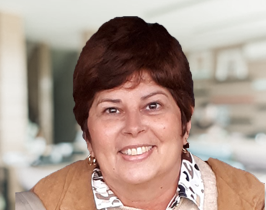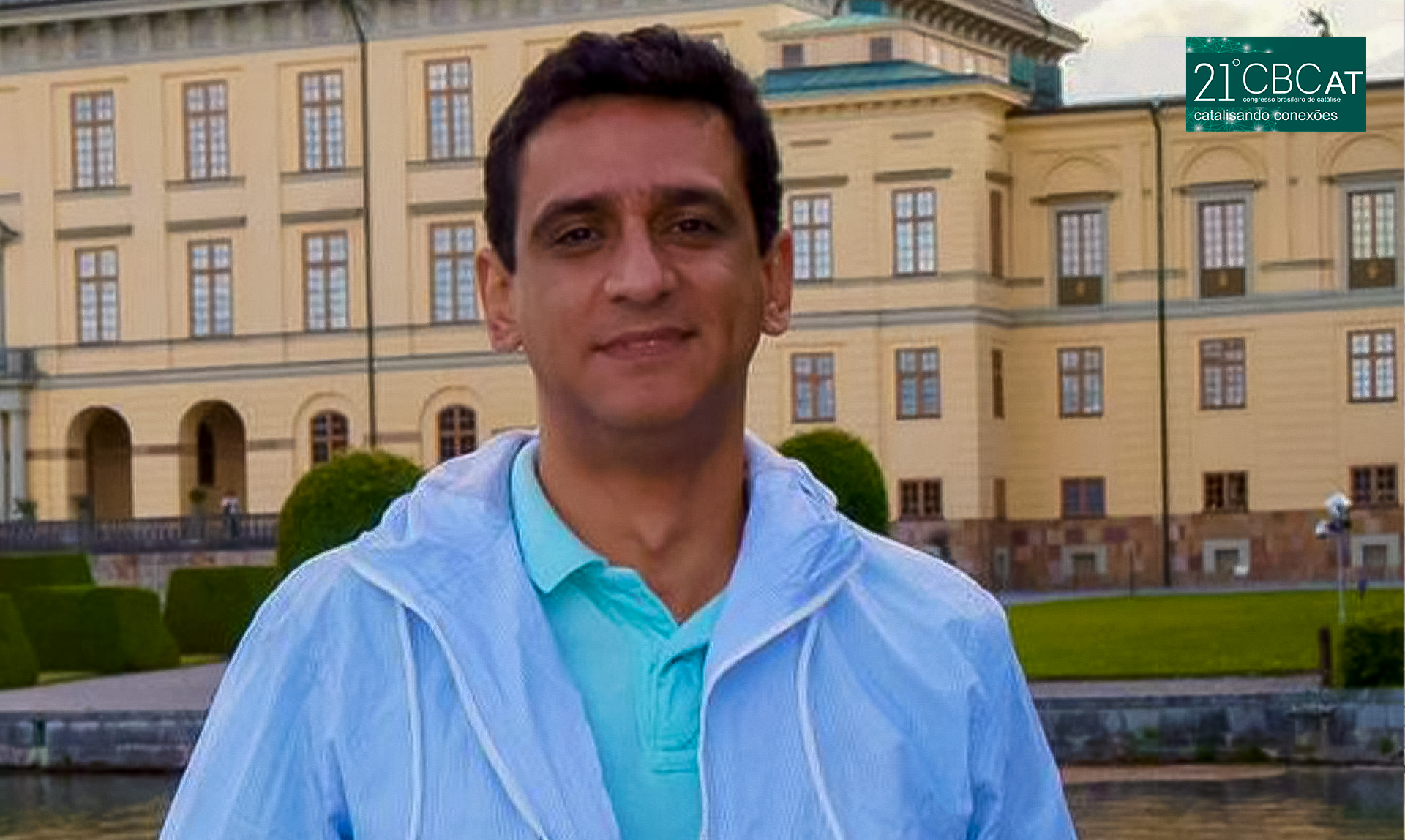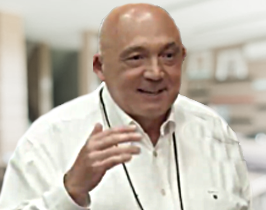 Título da palestra: Ethylene Oligo- and Polymerization Promoted by Chromium Complexes Bearing Schiff Base Ligands: Effect of Ligand Architecture on the Activity and Product Distribution
Título da palestra: Ethylene Oligo- and Polymerization Promoted by Chromium Complexes Bearing Schiff Base Ligands: Effect of Ligand Architecture on the Activity and Product Distribution
Resumo do palestrante: Osvaldo L. Casagrande Jr received his PhD degree in Inorganic Chemistry from the Institute of Chemistry, State University of São Paulo- UNESP in 1991. He was visiting professor at Federal University of Rio Grande do Sul (1992-1993), and became Assistant Professor in 1994. From 1996 to 1998 he was a postdoctoral fellow at University of Iowa in the Group of Professor Richard F. Jordan (1996–1998). In 2004 he joined the group of Professor Carpentier (University of Rennes) as visiting professor. He was head of Catalysis Division of the Brazilian Chemical Society from 2004 till 2006. From 2009 – 2013 he was Head of the Post-Graduate Program at the Institute of Chemistry – UFRGS. In 2012 he was promoted to Professor at the Department of Inorganic- Institute of Chemistry /UFRGS. He was a full member (Earth Sciences) of the Advisory Committee of the Postgraduate Pro-Rectorate (2014-2018) and titular member of the Board of the Institute of Chemistry (2017-2021). He is currently a titular member of the Research Council at Federal University of Rio Grande do Sul. His current research mainly focuses on the Organometallic and Coordination Chemistry involving groups 4-6, and 10 to application in oligo- and polymerization processes and production of polyethylene nanocomposites via polymerization-filling technique. Since 2000 he has developing research projects supported by petrochemical companies such as Braskem S/A, Petrobras S/A and Shell.Osvaldo L. Casagrande Jr received his PhD degree in Inorganic Chemistry from the Institute of Chemistry, State University of São Paulo- UNESP in 1991. He was visiting professor at Federal University of Rio Grande do Sul (1992-1993), and became Assistant Professor in 1994. From 1996 to 1998 he was a postdoctoral fellow at University of Iowa in the Group of Professor Richard F. Jordan (1996–1998). In 2004 he joined the group of Professor Carpentier (University of Rennes) as visiting professor. He was head of Catalysis Division of the Brazilian Chemical Society from 2004 till 2006. From 2009 – 2013 he was Head of the Post-Graduate Program at the Institute of Chemistry – UFRGS. In 2012 he was promoted to Professor at the Department of Inorganic- Institute of Chemistry /UFRGS. He was a full member (Earth Sciences) of the Advisory Committee of the Postgraduate Pro-Rectorate (2014-2018) and titular member of the Board of the Institute of Chemistry (2017-2021). He is currently a titular member of the Research Council at Federal University of Rio Grande do Sul. His current research mainly focuses on the Organometallic and Coordination Chemistry involving groups 4-6, and 10 to application in oligo- and polymerization processes and production of polyethylene nanocomposites via polymerization-filling technique. Since 2000 he has developing research projects supported by petrochemical companies such as Braskem S/A, Petrobras S/A and Shell.
 Título da palestra: Valorização do glicerol via catalise ácido básica
Título da palestra: Valorização do glicerol via catalise ácido básica
Resumo da palestrante: Graduada em Engenharia Química pela Universidade do Estado do Rio de Janeiro (UERJ), Mestre em Ciências em Engenharia Química pelo Programa de Engenharia Química da COPPE/Universidade Federal do Rio de Janeiro e Doutor em Ciências em Engenharia Química pelo Programa de Engenharia Química da COPPE/Universidade Federal do Rio de Janeiro, com estágio sandwich na Université de Poitiers, França. Atualmente é professora titular do Instituto de Química da Universidade do Estado do Rio de Janeiro, docente permanente e coordenadora do Programa de Pós-Graduação em Engenharia Química do IQ/UERJ e docente colaboradora do Programa de Engenharia Química da COPPE/UFRJ. Cientista do Nosso Estado, com bolsa da FAPERJ, e bolsista de Produtividade em Pesquisa nível 2 do CNPq. Participou da Diretoria da Sociedade Brasileira de Catálise (SBCat) no período de 2005 a 2015, ocupando a presidência entre 2011 e 2015. Tem experiência nas áreas de Tecnologia Química, Cinética, Catálise e Processos Catalíticos Heterogêneos atuando nas seguintes linhas de pesquisa: Síntese, caracterização e aplicação de zeólitas; Síntese, caracterização e aplicação de óxidos mistos derivados de hidrotalcitas; Remoção de substâncias tóxicas por adsorção e fotocatálise; Processos catalíticos aplicados aos setores de petróleo, petroquímica, química fina e biocombustíveis; e Valorização de derivados de biomassa.
 Título da palestra: Cascade Catalysis in Biomass Conversion to Fuels and Chemicals
Título da palestra: Cascade Catalysis in Biomass Conversion to Fuels and Chemicals
Resumo do palestrante: Marco André Fraga é engenheiro químico com doutorado pela UNICAMP (2000) na área de Catálise e Processos Catalíticos. Bolsista de Produtividade em Pesquisa do CNPq e Cientista do Nosso Estado pela FAPERJ, é pesquisador sênior do Instituto Nacional de Tecnologia, órgão do Ministério da Ciência, Tecnologia e Inovações (INT/MCTI). É professor permanente do Programa de Pós-Graduação em Química do Departamento de Engenharia Química do Instituto Militar de Engenharia (IME/RJ) desde 2013. Atuou como professor visitante no Departamento de Físico-Química da Universidad de Concepción (Chile) entre 2014-2017 e na Unidade de Catálise e Química do Estado Sólido da Ecole Centrale de Lille (França) em 2018/2019. Sua pesquisa é focada na área de Catálise, principalmente no desenvolvimento de catalisadores multifuncionais para a conversão de biomassa produção de intermediários químicos, aditivos, lubrificantes e combustíveis. É autor de várias publicações científicas, destacando-se o depósito nacional e internacional de 17 pedidos de privilégio de invenção (PI) no Brasil, nos EUA e na Europa, tendo já 5 patentes concedidas. Atualmente, compõe o Editorial Advisory Board da revista Industrial & Engineering Chemistry Research (ACS Publications) e o Editorial Board da Applied Catalysis A (Elsevier).
 Título da palestra: Semiconductores inorgánicos como catalizadores avanzados
Título da palestra: Semiconductores inorgánicos como catalizadores avanzados
Resumo do palestrante: Professor Juan Andrés has been a post-doctoral researcher at Uppsala University, Sweden(1984-1990); and a Visiting professor at both Pierre et Marie Curie University, Paris (1998 and 2000) and Centro de Desenvolvimento de Materiais Funcionais (CDMF), Brazil (2007 and 2014). On returning from the postdoctoral stay at the University of Uppsala, he decided to start a project aimed at developing and applying quantum mechanics in order to understand the structure and chemical reactivity in homogeneous, heterogeneous and enzymatic catalysis. Nobody in Spain (and only few people in Europe and the US) was working on that topic, which could fit into the field of “Theoretical and Computational Chemistry” (QTC).
In 1991 Juan Andrés founded at UJI, the “Theoretical and Computational Chemistry” (QTC) Laboratory. In 2000, QTC Laboratory reached the consideration of Center of Excellence Marie-Curie within Improving Human Research Potential and the Socio-Economic Knowledge Base (Research funding of the European Union; project IHP-MCHD-99-1; 2000-2004). Several years of hard work eventually allowed us to obtain good results, which were published as scientific articles in general chemistry journals (sixteen JACS, two Chemical Society Reviews, two Angewandte Chemie, six Chemistry – A European Journal), and in prominent specific journals on physics and chemistry. These articles were the first ones addressing this area of knowledge to be published in Spain, which allowed us to achieve new projects, consolidate this line of research and generate new results. In addition to this line of research, we started working in parallel on materials science and nanotechnology, and we managed and developed R&D&I projects in collaboration with universities in Spain, Sweden, France, Chile, and Mexico, as well as a close collaboration with the CDMF in Brazil. Consequently, the productivity of the QTC grew significantly with works devoted to understanding the chemical structure and the reaction mechanism, and to reaching a deep insight of the properties, on the atomic scale, that determine the macroscopic behaviour of micro- and nanomaterials.
While being QTC’s director, more than 175 researchers and technologists from over twenty countries were trained, 30 of whom obtained a doctoral degree under its direct supervision. Today, 12 of them are Full Professors and 20 of them are Senior Lecturers at universities in Europe and South America. More than 60 of them work as researchers both at universities and R&D&I centres or hold significant positions in different industries in over 20 countries. 5 of them have set up technology-based companies.This led to the publication of numerous scientific articles in high-index international journals. Since 2005, he has published more than 280 articles in leading international journals.
The work carried out by the QTC has enabled us to produce new materials with properties that have been modulated for technological applications, such as gas sensors, photocatalysts and materials containing silver nanoparticles with very powerful bactericidal and antifungal properties, synthesised by electron and/or laser irradiation. These results have, in turn, led to the creation and consolidation of three spin-offs and start-ups.
 O valor das inscrições para o 21º Congresso Brasileiro de Catálise estarão com desconto até o dia 31/07. Os valores variam entre R$100,00 a R$600,00, a depender da categoria inscrita. Não perca o prazo e inscreva-se já!
O valor das inscrições para o 21º Congresso Brasileiro de Catálise estarão com desconto até o dia 31/07. Os valores variam entre R$100,00 a R$600,00, a depender da categoria inscrita. Não perca o prazo e inscreva-se já!
Clique AQUI para inscrever-se.
